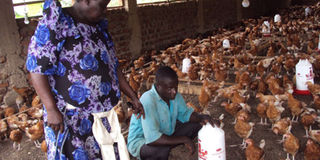FARMER'S PROFILE: Retired teacher earns big from urban farming

A farmer instructs an employee on how to feed the chicken. File photo.
She has 11 friesian cows, 1,800 birds and a flourishing banana plantation. She dispels claims that people in urban areas cannot practice farming, writes Fred Muzaale
A neat brick fence encloses a “100 X 100” feet piece of land along the busy portal road in the Central Ward, Division A in Entebbe Municipality. Apart from the banana leaves and a mango tree which can be seen protruding within the fence, it’s hard to imagine that there is any farming activity taking place behind this fence until you enter the enclosure.
A well- furnished house, 11 friesians cows in separate kraals and a flourishing banana plantation of about 15 plants are the first things you see as soon as you enter the fence. Behind the main house is a temporary structure housing the poultry unit of about 1,800 birds.
Inside the poultry unit, an elderly lady clad in a gomesi, sweats profusely as she struggles to put feeds and water in containers. The seemingly excited birds peck her hands and legs as she pushes them away. She is Ms Perepetua Wagumbulizi, a retired primary school head teacher and now a modern farmer. She tells her story.
“In 2006 while I was the headteacher of Nsamizi Army Primary School in Entebbe, I retired from civil service and came to live in this home which I had built together with my late husband the Late George Wagumbulizi,” she says.
Her husband died in 1998. Earlier, Ms Wagumbulizi says that in 1986 while still a teacher in Jinja, she bought one friesian heifer and took it to their home in Entebbe and started practicing zero-grazing.
“I bought the heifer mainly to get milk for myself and my children without knowing that this one cow will produce a herd in a few years,” she says.
Within a few years, the heifer produced offsprings, which also reproduced, forming a herd of 20 cows.
“But because I don’t have enough space and grass to feed a big herd, I sold off nine friesians at Shs900,000 each and remained with only 11 which I could afford to look after under zero-grazing,” Wagumbulizi who retired after 40 years as a Grade says III teacher says.
On average, she collects 60 litres of milk from her cows everyday and sells a litre at Shs1,200. She has ready market for her milk since she has permanent customers whom she supplies milk on a monthly basis and many of them pay her in advance.
“I want to maintain my herd at only 11 cows because getting pasture to feed the animals is hard and I also have little space,” the 60-year-old says.
Ms Wagumbulizi also has a well-maintained small banana plantation of 15 plants in which she uses some of the cow dung as fertilisers.
From the plantation, she harvests a big bunch of matooke at least once a week. Because she has a lot of cow dung, she dug a compost pit in which she collects the dung and mixes it with grass left-over by the cows and sells it as manure to farmers and organisations like Naro, Entebbe Golf Club, Entebbe Botanical Gardens at a cost of Shs35,000 per tractor.
“Every two weeks, I sell 12 trucks of manure while I give urine freely to people who want to use it,” she says. To further increase her income, Ms Wagumbulizi also started a poultry unit of 1,800 layers.
Ms Wagumbulizi manages her projects but has employed two youths to help her look after them. The two workers she employs milk the cows, look for pasture and also take the milk to customers.
The retired teacher says that apart from getting money from the project, she also gets milk, eggs and banana to feed her family. She is however limited by space on which she can expand her project.
“If it was not this project, as a widow with many children to look after, I would have failed to live in this town and gone back to the village,” she says.
She urges teachers to plan for their later years by initiating income generating projects while still in service.
She dispels claims that people in urban areas cannot practice farming and advises town dwellers to engage in urban farming to save some money they would have used to buy food or milk.
cap: Above, Ms Perepetua Wagumbulizi feeds her friesian cows. The retired teacher says that people in urban centres can practice farming despite the limited
resources, such as land.
MUZAALE
- Ms Wagumbulizi’s project at a glance
- One friesian cow turned into a herd of 20
- She sold off nine cows at Shs900,000 each and remained with only 11 which I could afford to look after under zero-grazing.
- She collects 60 litres of milk from her cows everyday and sells a litre at Shs1,200.
- She harvests a big bunch of matooke at least once a week.
- Every two weeks, she sells 12 trucks of manure, each at Shs35,000
- She also gets milk, eggs and bananas to feed her family




